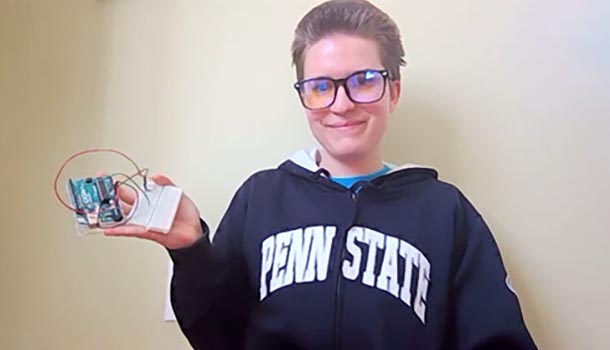
Sarah Fox, an undergraduate student studying mechanical engineering, with her Arduino kit that she uses to conduct experiments in ME 348. IMAGE: PROVIDED
New undergraduate engineering lab successfully stays 'hands-on' during pandemic
In the fall of 2020, mechanical engineering students replicated the on-campus laboratory experience with individual hardware kits at home
3/31/2021
By Erin Cassidy Hendrick
UNIVERSITY PARK, Pa. — When Penn State transitioned to online learning amid the pandemic, faculty sought ways to translate an engineering curriculum to an all-virtual environment. In the Department of Mechanical Engineering (ME), the abrupt transition coincided with a new, revitalized undergraduate course that provided each student with hands-on experience, regardless of location.
Herschel Pangborn, assistant professor of mechanical engineering, spearheaded the development of the streamlined four-credit laboratory course introduced in the fall of 2020, ME 348: Circuit Analysis, Instrumentation and Statistics.
“Our goal with ME 348 is to teach students both theory and practical applications,” Pangborn said. “We know from the literature on engineering education that hands-on labs should go beyond confirming equations from lectures by connecting theory to real-world examples.”
The class, which will be completed by all ME students during their junior year, simultaneously introduces the fundamental principles while framing that knowledge through a significant hands-on component.
“We’ve taken what was a theoretical focus on electrical circuits and added it to this laboratory course, orienting our instruction around the practical skills that mechanical engineers need,” he said.
Matt Erdman, a teaching assistant who contributed to the development and rollout of the course, acknowledged that the transition to an all-virtual curriculum provided an additional urgency to make the course agile and adaptable.
“Obviously, COVID-19 had numerous impacts on all courses,” he said. “However, since we were already reworking the labs, we were able to design certain components with at-home learning in mind instead of merely porting the labs into a virtual classroom.”
In that spirit, in lieu of a textbook, Pangborn asked his students to purchase an Arduino kit, originally developed for K-12 students to learn the basics of programming, coding and electronics. With a few additional advanced components such as accelerometers, the open-ended platform allowed ME students to design and build experiments that directly related to the material they were learning.
For instance, students were challenged to design a cantilever beam or pendulum and instrument it with an accelerometer to analyze and understand its vibrations.
“It was interesting to see what they came up with. They used rulers, clothes hangers, different things they found in their house to create this experiment,” Pangborn said. “It really challenged their creativity and customized the activity to their interests and environment.”
With the fundamental hardware components in every student’s workspace, Pangborn believes students experienced a more impactful learning experience, as compared to a traditional lab.
“They owned these components. It allowed them to take ownership of the course materials a little more as well,” he said. “It encouraged them to play around with things, possibly more than if they just came into an on-campus lab three hours a week.”
Several students enrolled in the course confirmed his sentiment.
Jonah Glunt, a junior majoring in ME, said, “Even during lectures when Professor Pangborn is speaking, I’m able to have the kit next to me and see how it works in real life, which I find to be very useful.”
Pangborn explained other ME professors are integrating the Arduino kits into their courses.
“Students who took ME 348 in the fall are using their Arduino kits again this spring in ME 454: Mechatronics, together with even more advanced circuit components that will help take their knowledge to the next level. We want students to keep building their skills and learning in impactful ways,” Pangborn said. “This is keeping our curriculum moving into the future.”
Pansy Leung, director of undergraduate laboratories; assistant professors Jean-Michel Mongeau and Brian Foley; and Eric Marsh, the Glenn Professor of Engineering Education and associate head for undergraduate programs, also contributed to the development of the course.
“This course is a good example of the department’s dedication to keeping up to date with changing technologies while exploring new methods to further cement students’ learning objectives,” Erdman said.



